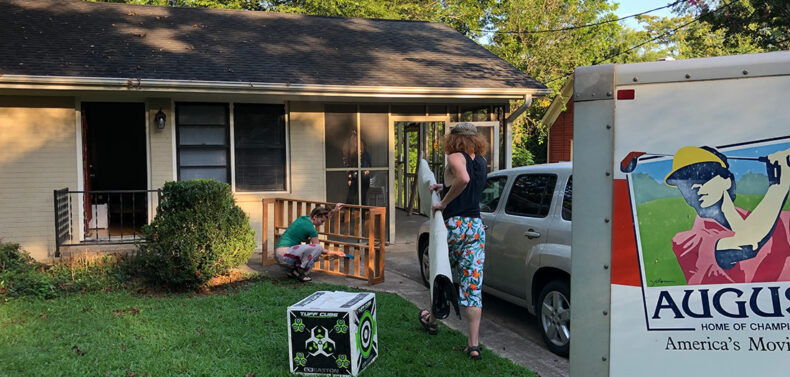More people in Athens—particularly college students—rent than own their own homes. Sometimes that can subject tenants to an unequal relationship with their landlords. Landlords seem to have all the power. Or do they?
While Georgia isn’t the most tenant-friendly state by any stretch, renters do have rights here. Landlords can’t just do anything they want, even if it seems like it sometimes. They have responsibilities under the law, the first and most basic of which is to provide you with a copy of your lease or rental agreement.
Disclaimer: The writer is not a lawyer. This article is intended as a summary of tenants’ rights in Georgia, but it is not legal advice. If you have trouble with your landlord, you should get in touch with a lawyer (such as those at Georgia Legal Services) and not rely on anything written here. Georgia Legal Services, Georgia Legal Aid, ACC Code Enforcement, the Georgia Department of Community Affairs and a local housing attorney provided the legal information for this article.
Right to Negotiate
Your lease is a legal document that lays out the terms of your agreement with your landlord. It’s the reason why you’re allowed to stay on your landlord’s property at all. It also binds the landlord into certain commitments, such as not raising rent for a period of time. But landlords are typically the ones who write these agreements, so the terms are usually stacked in their favor.
It doesn’t have to be like that. According to the law, you have the right to negotiate anything that’s in your lease. Read it. Ask questions. If you don’t like a certain provision, you have the right to discuss it with your landlord and to try to get it changed.
Landlords are used to getting their way, so in most cases they will not agree to negotiate with you. You should have a back-up plan before even trying it. But no landlord can tell you that you don’t have the right to help draft the lease agreement. You do, even if this right isn’t worth much in practice.
Maintaining the Property
Your landlord is the one who owns the rental unit, so he or she is generally the one who is responsible for maintaining it. Unfortunately, landlords can sometimes get around this responsibility. For example, rental housing does not necessarily need to be fit for human habitation in Georgia, according to law. The state legislature considered making it a requirement this year with HB 404, but that bill failed to pass the Georgia Senate.
The good news is that your housing must be built to code. For example, ACC Code Enforcement requires that housing have working toilets, sinks, electrical outlets, doors and windows, roofs that don’t leak, smoke detectors, heating and hot water. Unfortunately, air conditioning is not required at all, and though most apartment complexes offer pest control, infestations of pests inside your unit are generally your responsibility, not your landlord’s.
If possible, before you sign the lease you should inspect your home and make a note of anything that’s broken or not up to code. Inform your landlord about it immediately. Generally, landlords only need to maintain a property in the condition it was when you first leased it. So, if your landlord doesn’t promise to fix something immediately, they might not ever be legally required to do so. Make sure to get the landlord’s promise to fix the unit in writing so they can’t deny it later.
The takeaway here is that if your heat suddenly goes out in the winter or if one day your roof starts leaking, the repair is definitely your landlord’s responsibility. If they don’t fix it, keep paying rent and get in touch with a lawyer. You can also file a complaint with ACC Code Enforcement to make your landlord take responsibility by contacting them at 706-613-3790 or [email protected].
Discrimination Is Illegal
Everyone deserves access to housing, and no one should be denied a place to live because of discrimination. That’s not just a platitude—it’s the law. The federal Fair Housing Act of 1968 prohibits discrimination based on race, sex, religion, familial status or disability. Georgia passed a very similar anti-discrimination law in 1988.
This means that landlords must be inclusive when offering rental properties to different kinds of people. They can’t deny you housing because you’re Black, for example, and they can’t charge you higher rent because you have children. They must also provide reasonable accommodations for you if you’re disabled.
The Fair Housing Act was a huge step forward for 1968, but it does leave some people out. That’s why Athens passed an even tougher law on the local level in 2021 that protects residents from discrimination based on sexual orientation, gender identity, age, marital status or veteran/military status. Landlords in Athens can’t deny you housing because you’re young or because you’re gay, for example. They have to treat you exactly as they would treat a straight, older man.
If you feel your right to fair treatment has been violated, you can file a complaint with the ACC Attorney’s office. The ordinance even provides some protection for you as you come forward; if you are retaliated against, that would be considered a second violation.
You should also consider filing a state or federal-level complaint if you feel you’ve been discriminated against, but make sure to talk to a lawyer first.
The Right to Due Process
No matter how long you’ve gone without paying rent, your landlord can’t evict you without going through the court system. They can’t just change the locks one day. Some landlords will try and convince you an eviction is coming in the hopes that you’ll move out on your own. While you might want to avoid an eviction to keep it off your permanent record, your landlord can’t evict you without going through the legal system. Eviction proceedings only begin when you’ve heard it from the sheriff’s department. At that point, you’d have seven days to pay the rent you owe. If you pay it, you cannot be evicted.
If you can’t pay, make sure to answer the court summons either verbally or in writing, giving your best reason why you shouldn’t be evicted. And of course, make sure to be there for your day in court. The landlord might be willing to negotiate with you, regardless of what they’ve said previously. In a worst case scenario where the court decides to go through with the eviction, you’ll probably have around two weeks from the date of your hearing to pack your things and move out before you’d be forced out. After being evicted, the lease is terminated, and you won’t owe any further rent.
Security Deposits
Security deposits are an important form of insurance for landlords in case a renter breaks something and refuses to pay for it. But it’s your money. You absolutely have the right to get your security deposit back in most cases.
During your move-in inspection (do this before paying your security deposit), you and your landlord will agree on everything that’s broken in the unit. Your landlord can’t charge you for any of this damage when you move out. Your landlord is also responsible to fix things that break due to normal wear and tear over the course of your lease, so they can’t charge you for that either. Your landlord is only legally allowed to keep your security deposit for reasonable compensation in the case of damage that you or a guest caused to the property on purpose or by accident, or for unpaid rent, fees, utilities expenses or something similar.
When it’s time to move out, make sure to include all damages on your move-out form, but if you have any doubts, don’t sign the form. It may be tempting to take whatever part of the security deposit your landlord is willing to give you, but if you do that, you might lose the right to the remainder of your deposit. If you think you might be owed more, talk to a lawyer before signing anything.
Finally, make sure to provide your landlord with a valid address so they can send you the amount of the security deposit you’re owed. This is your money. You should get it back.
Like what you just read? Support Flagpole by making a donation today. Every dollar you give helps fund our ongoing mission to provide Athens with quality, independent journalism.










